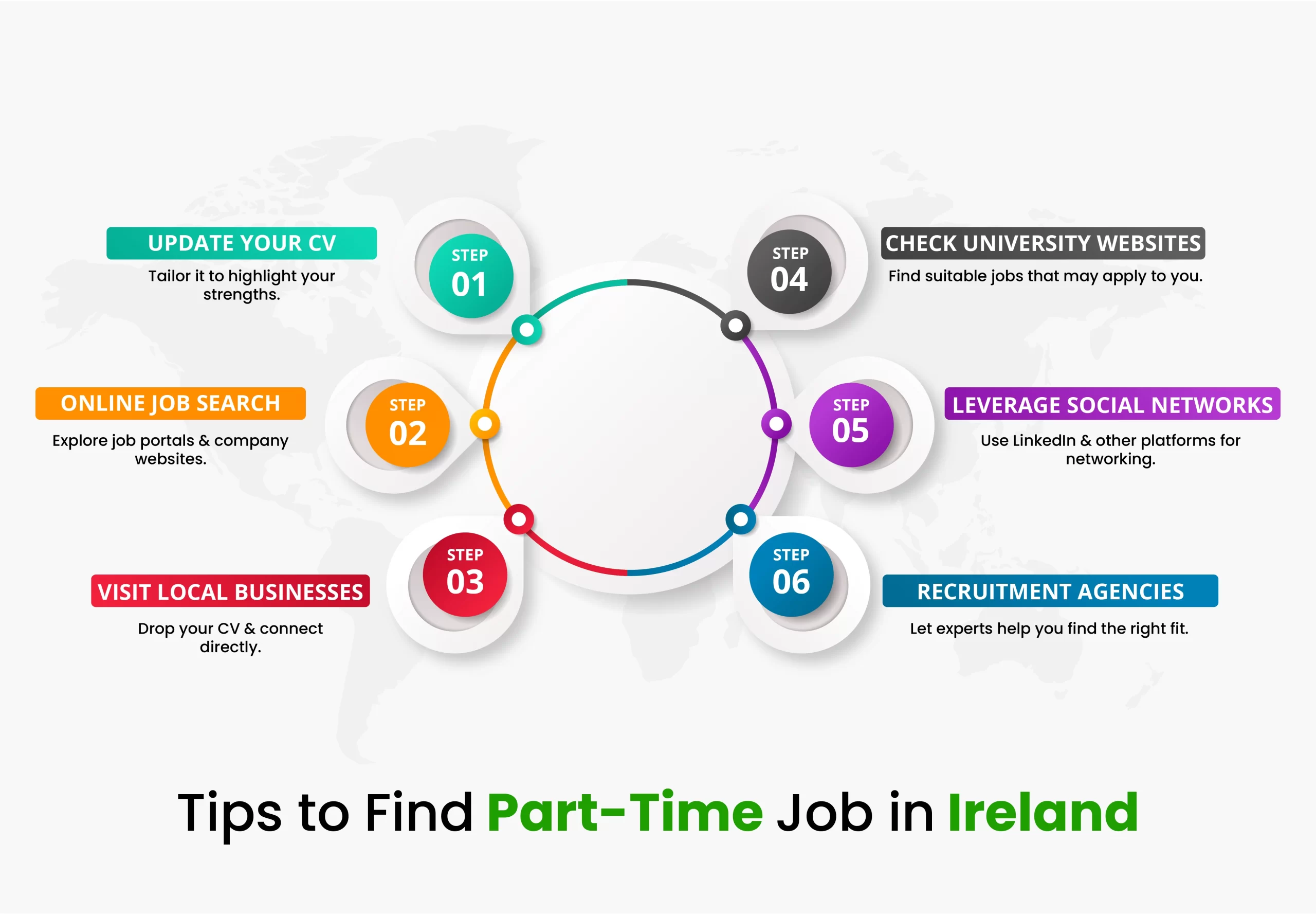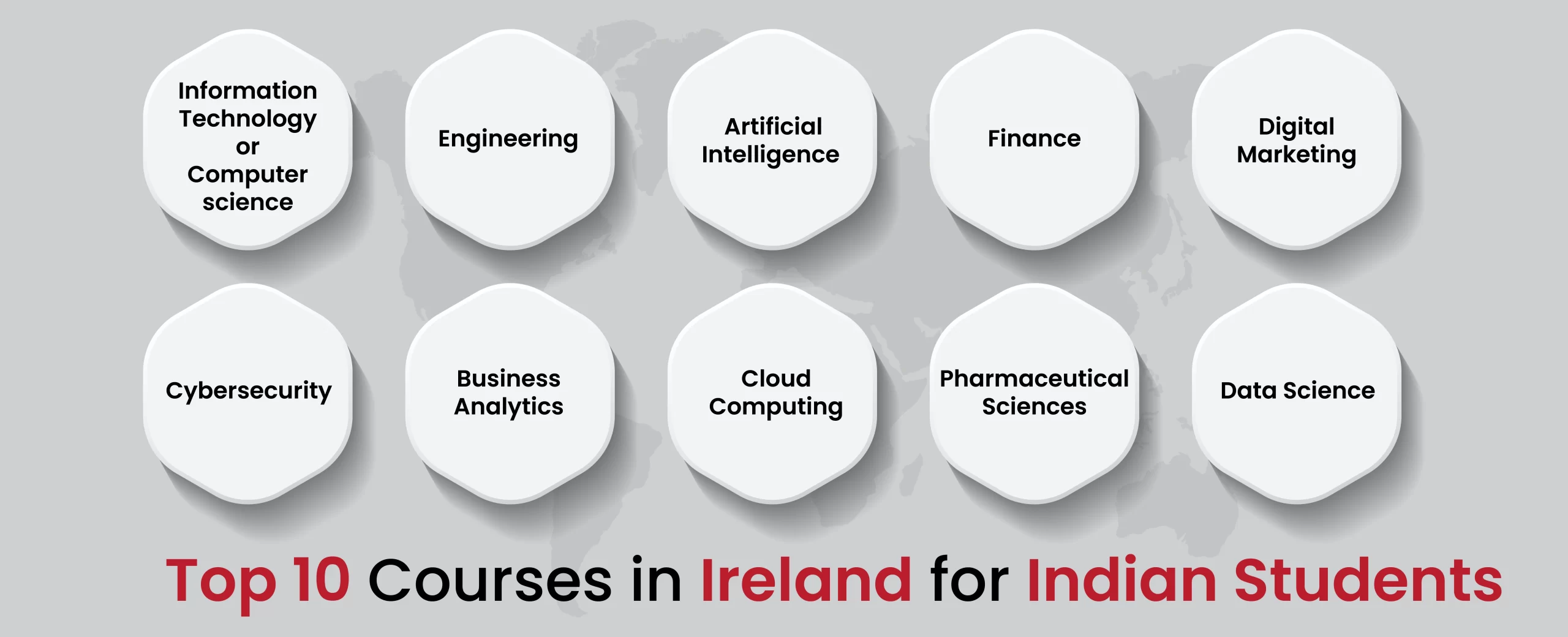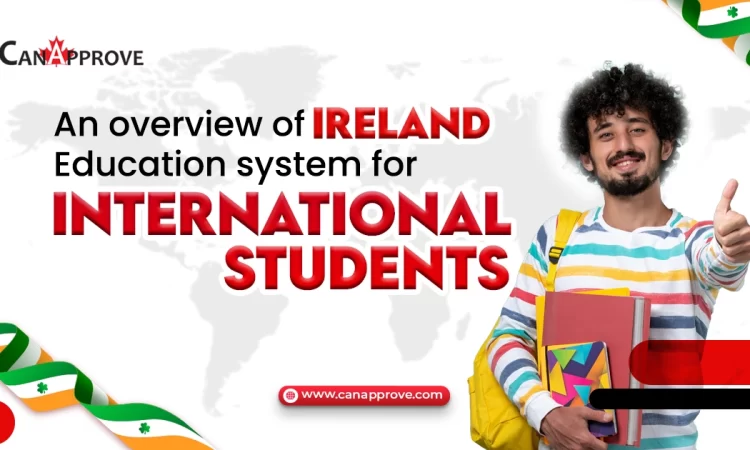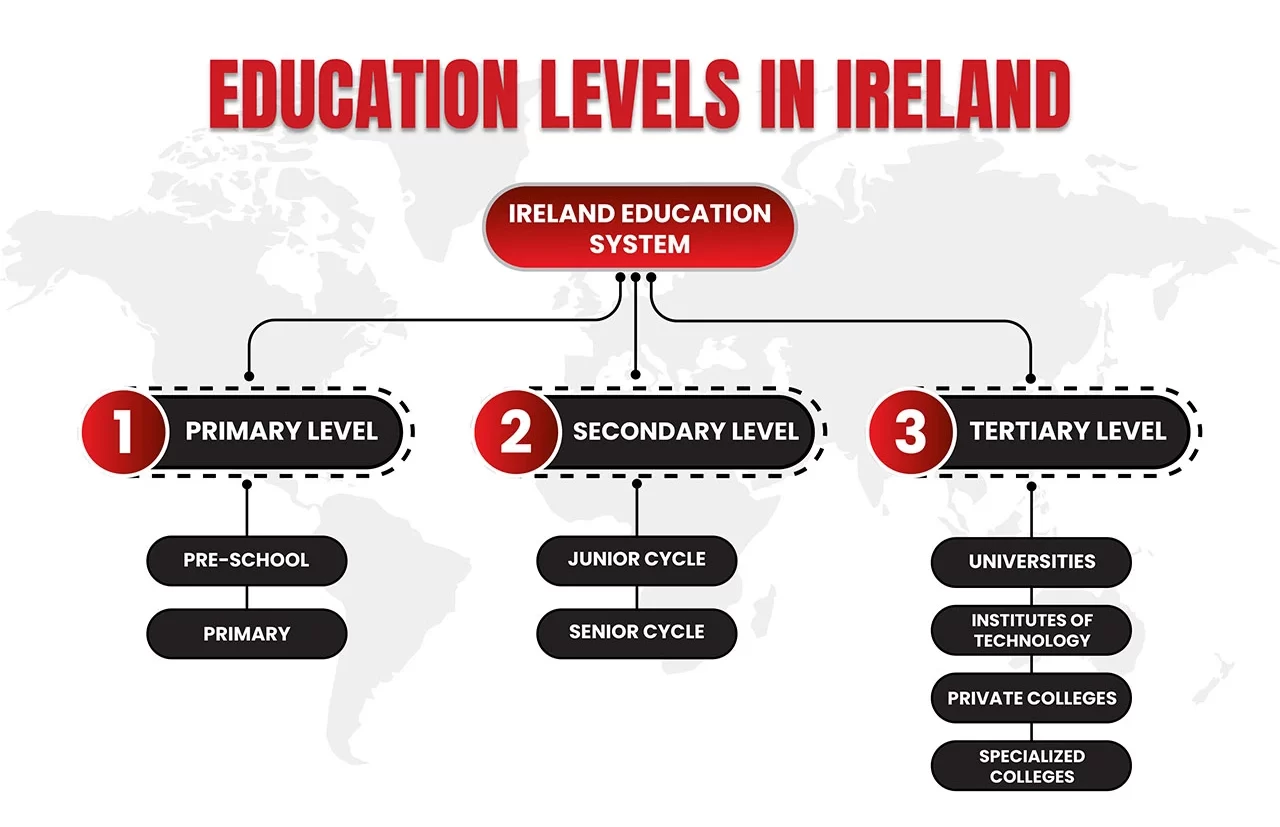Ireland is one of the top affordable study-abroad destinations for students who wish to pursue their education in an international setting. For international students in Ireland, balancing their studies with a part-time job is a great way to earn some extra money and gain valuable work experience. Although, it is important to find a part-time job that not only fits your academic schedule but also offers you a decent wage. Let’s take a look at the highest-paying part time jobs in Ireland for International Students. Before that, let’s take a look at why doing part-time jobs would benefit you.
Table of Content
1Benefits of part time jobs in Ireland2Types of part time jobs in Ireland3Part-Time Job Rules in Ireland4Eligibility for Part-Time Job in Ireland5Part time jobs in Ireland for International Students6Part-Time Working Hours in Ireland7Part-Time Job Salary in Ireland8Tips to Find Part-Time Job in Ireland9Conclusion10Frequently Asked Questions
Benefits of Part Time Jobs in Ireland
There are several benefits to doing part time jobs in Ireland.
1. Monetary Freedom
Simply put, you get financial freedom. Part-time jobs are a reliable source of supplementary income, and you get to live a bit more comfortably with the money you earn, as you can use it for groceries, transport, and other supplies.
2. Valuable International Background
You get to work in an international background and gain practical experience and exposure in a professional setting, and the skills you require to help you to get jobs easily in the long run.
3. Flexibility
Most companies in Ireland let you work flexible hours so that you can accommodate your academic commitments and personal obligations providing you with tailored shifts so that you work on the weekends or nights.
4. Social Interaction
You get to expand your social circle by meeting new people and establishing connections with colleagues and customers, especially when you’re in a new country. Social interactions create a support network and can reduce the feeling of isolation.
Types of Part Time Jobs in Ireland
There are three types of part time jobs in Ireland:
1. On-Campus Jobs
You can apply for the on-campus jobs that are available at your university by applying through the university website. Some of the best part-time jobs are Teacher Assistant, Library Assistant, Barista, tutor, campus tour guide, etc.
2. Off-Campus Jobs
You can work outside your university campus, in business companies or organisations in the local community like retail shops, supermarkets, customer service, or paid internships. But you may need to commute a long distance and might require longer hours. So, time management is crucial if you decide to do off-campus work.
3. Online
An advantage of online work is that you can work remotely and work flexible hours, even from the comfort of your own home. With the rise of remote work, students now opt for online part-time work more. You can search for online part-time jobs by going through the job application portals available in Ireland, and by asking your friends directly. The most common roles include freelance writing, graphic designing, and online tutoring.
Part-Time Job Rules in Ireland
There are certain rules if you are to work part time jobs in Ireland.
Age Requirements
You have to be 18 years old to work part-time.
Eligibility
Only international students with a Stamp 2 Visa (study visa) are permitted to work part-time.
Working Hours
During the academic time, you can work for 20 hours a week.
Whereas, during the holidays you can work up to 40 hours a week.
Job Restrictions
Students cannot take up full-time employment with a study visa.
Minimum Wages
For adult employees, the minimum wage is €13.50 per hour since 1 January 2025. On the other hand, a person aged below 20, is paid less than the minimum wage received by an adult.
Employer Compliance
The employer must ensure that the student’s visa allows them to work part-time and must follow the rules set by the Ireland government and the allocated work time hours.
Eligibility for Part-Time Job in Ireland
Students need to meet certain eligibility criteria to work part-time jobs. Let’s see what they are:
- You have to be registered in a full-time program that is listed in the Interim List of Eligible Programmes (ILEP), which lasts for at least a year and should lead to a recognised qualification at or above NFQ Level 6.
- Students should have a Stamp 2 status, which is issued to non-European students enrolled in a full-time course.
- You must be at least 18 years old.
- It is mandatory to attend your classes regularly if you want to work part-time jobs. If you fail to maintain attendance, it may cause work eligibility restrictions.
- The employer must verify your immigration status and make sure that you are permitted to work part-time in the country.
- You will also need a valid IRP (Irish Residence Permit) card, showing Stamp 2 status, which is required to work.
- You also need to be registered with the Garda National Immigration Bureau(GNIB).
Part Time Jobs in Ireland for International Students
| S.No | Job Overview | Eligibility Criteria | How to Apply |
|---|---|---|---|
| 1 | Tutor/Teaching Assistant | Strong academic background in a specific subject, excellent communication and patience | University career services, online tutoring platforms |
| 2 | Library Assistant | Excellent organisational and communication skills, attention to detail | Apply directly to university libraries, online job boards |
| 3 | Research Assistant | Relevant academic background, strong research and analytical skills | University departments, online research platforms |
| 4 | Campus Tour Guide | Communication and interpersonal skills, good knowledge of the university | University student services, campus tourism departments |
| 5 | Babysitter | Childcare experience, responsibility, patience | Online platforms, word-of-mouth |
| 6 | Customer Service Representative | Excellent communication and problem-solving skills, good phone etiquette | Online job boards like Indeed, Jobsireland, company websites |
| 7 | Social Media Manager or Content Creator | Social media and creative writing skills, basic graphic design skills | Online job sites, freelance platforms, social media agencies |
| 8 | Freelance Writer or Translator | Excellent writing and communication skills, proficiency in more than one language | Online freelance platforms (e.g., Upwork, Fiverr), content mills, direct clients |
| 9 | Cafe Worker | Friendly personality, basic coffee-making skills, and good communication | Directly apply to local cafes, and online job sites like Indeed, Jobsireland |
| 10 | Dog Walker/Pet Sitter | Experience with animals, responsible and reliable, physically fit | Online platforms, local pet stores, word-of-mouth |
Part-Time Working Hours in Ireland
As an international student in Ireland, you can legally work up to 20 hours a week during term time. This ensures that a student does not overburden themselves and can balance their academic commitments while doing part-time.
On the other hand, you can work up to 40 hours during the holidays (June to September). You can also work for 48 hours during the holidays, only if your average work time for a three-month duration doesn’t exceed 40 hours. This provides you with the chance to earn more. You just have to make sure that your visa is a Stamp 2 Visa, so that you are eligible to work part-time while you study in Ireland.
Part-Time Job Salary in Ireland
1. Tutor/Teaching Assistant: €15-€30 per hour
2. Library Assistant: €10-€14 per hour
3. Research Assistant: €12-€20 per hour
4. Campus Tour Guide: €10-€13 per hour.
5. Barista/Café Worker: €10.50-€13 per hour + tips
6. Dog Walker/Pet Sitter: €10-€15 per hour
7. Customer Service Representative: €10.50-€14 per hour
8. Babysitter: €10-€15 per hour
9. Freelance Writer: It depends.
10. Social Media Manager or Content Creator: €20-€50 per hour, it varies.
Tips to Find Part-Time Job in Ireland

Here are some of the tips to find part time jobs in Ireland for International Students:
1. Updated CV
As simple as the step is, creating a simple and professional CV tailored to the job you are applying for can help you a lot. Make sure that you highlight your prior experience if you have any.
2. Online Job Search
Using job portals like IrishJobs.ie, Jobs.ie, Indeed.ie, and social media platforms can help you find part-time job opportunities.
3. Visit Local Businesses
You can approach the cafes, restaurants, shops, or supermarkets near your university as many part-time jobs aren’t advertised online and prefer walk-in applicants.
4. Check University Websites
There would be part-time on-campus job openings on your university’s career portal or notice boards to which you can apply.
5. Leverage Social Networks
Many job opportunities are found through referrals and word of mouth and these jobs can be found by connecting with your friends, classmates, and local communities.
6. Use Recruitment Agencies
Another easy way to find jobs is by registering with recruitment agencies that help you find part-time jobs.
Conclusion
In conclusion, if you are an international student who is about to or is already pursuing your degree, doing part time jobs in Ireland can provide you with competitive pay and valuable experience. Choosing a high-paying part-time job that aligns with your strengths and skills can help cover your living expenses and enhance your future job prospects.
Suffice to say, that Ireland offers a wide range of part-time job opportunities for its international students. Just remember to work only during the permitted working hours, and to prioritize your academics while enjoying the financial freedom and professional benefits that you get from part-time work.
Are you someone who dreamt of studying abroad in a destination like Ireland? If you are, let CanApprove experts guide you from application guidance to visa assistance. Start your journey to Ireland with confidence by contacting CanApprove today and take the first step toward achieving your study abroad dreams!





